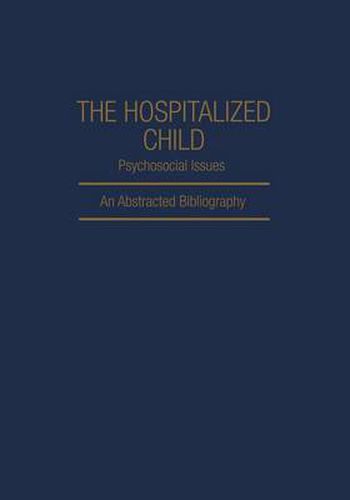Readings Newsletter
Become a Readings Member to make your shopping experience even easier.
Sign in or sign up for free!
You’re not far away from qualifying for FREE standard shipping within Australia
You’ve qualified for FREE standard shipping within Australia
The cart is loading…






This title is printed to order. This book may have been self-published. If so, we cannot guarantee the quality of the content. In the main most books will have gone through the editing process however some may not. We therefore suggest that you be aware of this before ordering this book. If in doubt check either the author or publisher’s details as we are unable to accept any returns unless they are faulty. Please contact us if you have any questions.
The Hospitalized Child: Psychosocial Issues is a comprehensive, abstracted bibliography focusing on the behavioral and developmental consequences of short-term, long-term or recurrent hospitalization during childhood and adolescence. The emphasis of this volume is on the psychosocial issues related to the hospital experience/environ ment, rather than on adaptation to or coping with particular disease states or terminal illness. Publications are included which identify potential problems of hospitalization, coping mechanisms of patients, parents, and staff, and possible solutions. For example, the articles covered in this volume discuss the trauma which may result from the child’s separation from mother/family/peers, anxiety over medical pro cedures, unfamiliarity of the hospital environment, absence from school, restrictions on physical activity, forced dependency and con cerns over body image. The search for solutions to adaptation diffi culties often results in the creation of new hospital programs. These too are reviewed in this bibliography. Examples include child-life programs, the care-by-parent units, foster grandparent/surrogate mother programs, and hospital or surgical orientation programs. New therapeutic approaches have been attempted in a hospital setting, in cluding bibliotherapy, puppet therapy, play therapy and mutual-story telling techniques. Each of these innovations is represented in the bibliography. Further, hospital redesign schemes are reviewed, in cluding the feasibility of separate adolescent wards. And finall~, modification of hospital policy has been examined, including estab lishment of liberal visiting privileges, parent rooming-in, day v vi PREFACE surgery, and improved communication between patient, parent, and hos pital staff.
$9.00 standard shipping within Australia
FREE standard shipping within Australia for orders over $100.00
Express & International shipping calculated at checkout
This title is printed to order. This book may have been self-published. If so, we cannot guarantee the quality of the content. In the main most books will have gone through the editing process however some may not. We therefore suggest that you be aware of this before ordering this book. If in doubt check either the author or publisher’s details as we are unable to accept any returns unless they are faulty. Please contact us if you have any questions.
The Hospitalized Child: Psychosocial Issues is a comprehensive, abstracted bibliography focusing on the behavioral and developmental consequences of short-term, long-term or recurrent hospitalization during childhood and adolescence. The emphasis of this volume is on the psychosocial issues related to the hospital experience/environ ment, rather than on adaptation to or coping with particular disease states or terminal illness. Publications are included which identify potential problems of hospitalization, coping mechanisms of patients, parents, and staff, and possible solutions. For example, the articles covered in this volume discuss the trauma which may result from the child’s separation from mother/family/peers, anxiety over medical pro cedures, unfamiliarity of the hospital environment, absence from school, restrictions on physical activity, forced dependency and con cerns over body image. The search for solutions to adaptation diffi culties often results in the creation of new hospital programs. These too are reviewed in this bibliography. Examples include child-life programs, the care-by-parent units, foster grandparent/surrogate mother programs, and hospital or surgical orientation programs. New therapeutic approaches have been attempted in a hospital setting, in cluding bibliotherapy, puppet therapy, play therapy and mutual-story telling techniques. Each of these innovations is represented in the bibliography. Further, hospital redesign schemes are reviewed, in cluding the feasibility of separate adolescent wards. And finall~, modification of hospital policy has been examined, including estab lishment of liberal visiting privileges, parent rooming-in, day v vi PREFACE surgery, and improved communication between patient, parent, and hos pital staff.